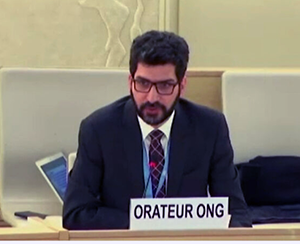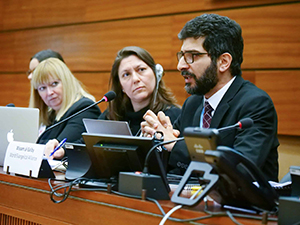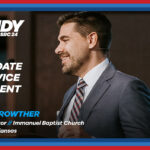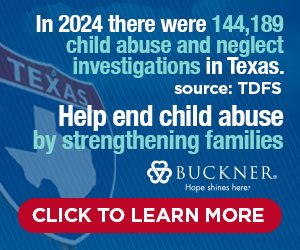Wissam al-Saliby, a Lebanese Baptist with experience advocating for human rights and international religious freedom, is the new president of 21Wilberforce.
He succeeds founding president Randel Everett, former executive director of the Baptist General Convention of Texas, who retired from 21Wilberforce in December.

Al-Saliby most recently served with the World Evangelical Alliance, first as advocacy officer and then as director of the international organization’s Geneva office. While in that role, he was vice chair of the United Nations NGO Committee on Freedom of Religion or Belief.
Previously, he was manager of development and partner relations at Arab Baptist Theological Seminary in Lebanon.
He also worked with Geneva Call, a humanitarian organization that focuses on peacemaking and protecting civilians living in situations of armed conflict.
Al-Saliby graduated from Lebanese University and earned a master’s degree in international law from the Université Paul Cézanne in France.
His academic background and various elements of his previous work experience all helped to prepare him for his new role with 21Wilberforce, al-Saliby told the Baptist Standard.
“Every one of them had significant, unique added value,” he said.
Al-Saliby believes religious freedom requires a broad, holistic worldview.
Sign up for our weekly edition and get all our headlines in your inbox on Thursdays
“Working with Baptists in Lebanon and the Middle East, I grew convinced that Christians should not be content in their own safe zone,” he said. “Religious freedom requires a commitment to human rights, peacemaking and fulfilling God’s calling to be missional.”
Shaped by experience in Lebanon
Al-Saliby grew up in Beirut, where he learned both what it means to live with the constant threat of violence and to live in harmony with people of diverse religious backgrounds.
“The first seven years of my life were the last seven years of a 15-year civil war,” he recalled.
However, he noted, his school years were spent in classrooms where Christians of various traditions, Muslims and others interacted peacefully on a daily basis.
“When I became an adult, I really appreciated the fact that you can grow in such a context in Lebanon,” he said. “The ability to connect with people of other faiths easily is something I valued.”
Out of that context, al-Saliby felt drawn to the study of international law and human rights.
“I had a passion and a calling to defend human dignity, human life—including in conflict—as well as human rights, including religious freedom,” he said.
Because Lebanon is “a nation of minorities,” no religious group enjoys privileged status at the expense of others, and the right of people to practice their faith is protected, he added.
Al-Saliby grew up in the Orthodox Church, where his extended family continues to worship. As an older teenager, he began attending evangelical meetings.
“I felt drawn to the Bible studies,” he said. “I journeyed in different evangelical denominations until 2013, when I joined a Baptist church and began serving with Arab Baptist Theological Seminary.”
In working with the seminary and with Lebanese Baptist churches, al-Saliby was impressed by their ability to “serve the broader society … to serve everyone, whether they were Muslim or Christian,” while at the same time being “very missional and vocal, witnessing to the lordship of Jesus Christ.”
Partner with Baptist World Alliance
21Wilberforce partners with the Baptist World Alliance to advance religious freedom awareness, training, support and advocacy. Al-Saliby sees that partnership as “an alignment of visions and callings” and a continuation of his work at the World Evangelical Alliance.
“WEA is a big family of 600 million evangelicals in more than 140 alliances all over the world,” he said. “So, I’m moving from one big family to another big family.”

BWA General Secretary Elijah Brown underscored the importance of the partnership between BWA and 21Wilberforce.
“Religious freedom is a defining value of Baptists, and advancing it globally is a central missional commitment of the BWA,” Brown said. “At a time when 30 percent of all BWA Baptists face the reality of war, persecution, and extreme hunger, the need is as great as ever.
“Wissam brings great passion and experience to this role. … I look forward to working with Wissam and in partnership with 21Wilberforce as together we seek to address some of the most pressing challenges in the world.”
‘Start locally’
Al-Saliby recognizes the value of national and international advocacy at high levels, and 21Wilberforce will continue to engage with the United Nations and its Human Rights Council.

The report was released by the Geneva Graduate Institute in partnership with the World Council of Churches., ACT Alliance, Caritas Internationalis, and World Evangelical Alliance. (WEA Photo)
However, he emphasizes real progress depends on building the capacity of local people—helping to train and equip local leaders who can speak for themselves.
“There is too much international advocacy and not enough national leadership in advocacy,” he said. “Local leaders need to tell us what to do and how to do it. … Start locally. … We need to listen to people in the field.”
Al-Saliby believes religious freedom should be viewed from a broad human rights perspective, not looking at religious persecution in isolation.
“Hot spots are everywhere. … There is conflict. There is violence that is multi-layered. It includes the religious dimension, but it is very multi-layered. It’s economic. It’s political,” he said.
“Hot spots are all over the place. Hot spots are the weak rule of law, human rights violations, conflict and—almost inevitably—religious freedom violations.”
Al-Saliby wants to see churches engaged in encouraging human flourishing and strengthening the rule of law in their own local and national contexts.
“What we have seen in the last decade is that naming and shaming is not yielding results,” he said.
Even democratic countries often are failing to prioritize human rights, he added.
“One important answer to this challenge is local, vocal, equipped and capable leadership,” he said. “It’s Christians speaking out for human rights for everyone and religious freedom for everyone, and working for societies that are much more tolerant and accepting of everyone and governments that are respectful of human rights and the dignity of every single human being, because that is their God-mandated obligation.”
















We seek to connect God’s story and God’s people around the world. To learn more about God’s story, click here.
Send comments and feedback to Eric Black, our editor. For comments to be published, please specify “letter to the editor.” Maximum length for publication is 300 words.